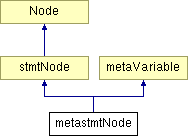
#include <meta.h>
Inheritance diagram for metastmtNode::

Public Methods | |
| metastmtNode (idNode *id) | |
| virtual void | visit (Visitor *the_visitor) |
| Dispatch a Visitor. More... | |
| virtual void | walk (Walker &the_walker) |
| Dispatch a Walker. More... | |
| virtual Node * | change (Changer &the_changer, bool redispatch=false) |
| Dispatch a Changer. More... | |
| virtual void | dataflow (FlowVal *v, FlowProblem &fp) |
| Run the dataflow analyzer. More... | |
| virtual Node * | clone () const |
| Clone the input node. More... | |
| virtual void | output_stmt (output_context &ct, Node *par) |
| Output a statement. More... | |
Static Public Methods | |
| bool | is_meta_stmt (char *name) |
| void | add_meta_stmt (char *name) |
| void | clear () |
Static Private Attributes | |
| list< string > | meta_stmt_variables |
|
|
|
|
|
|
|
||||||||||||
|
Dispatch a Changer. This abstract method works much the walker, but allows the tree to be changed.
Reimplemented from Node. |
|
|
|
|
|
Clone the input node. This is not a "deep" clone, so be careful. For a deep clone, use the clone_changer class.
Reimplemented from Node. |
|
||||||||||||
|
Run the dataflow analyzer. Each subclass overrides this method to define it's semantics for dataflow analysis. It alters the input flow value to reflect the effect of the node within the given flow problem, calling dataflow() on it's subtrees as necessary. See the dataflow analysis documentation for more information.
Reimplemented from Node. |
|
|
|
|
||||||||||||
|
Output a statement.
Reimplemented from stmtNode. |
|
|
Dispatch a Visitor. This abstract method is the entry point for the visitor design pattern. Each node subclass defines a visit() method that calls the appropriate at_ method in the visitor. For more information see the Visitor documentation.
Reimplemented from Node. |
|
|
Dispatch a Walker. This abstract method works much like the visitor, but instead walks the entire underlying subtree calling the appropriate at_ method at each node. For more information see the Walker documentation.
Reimplemented from Node. |
|
|
|
 1.2.13.1 written by Dimitri van Heesch,
© 1997-2001
1.2.13.1 written by Dimitri van Heesch,
© 1997-2001